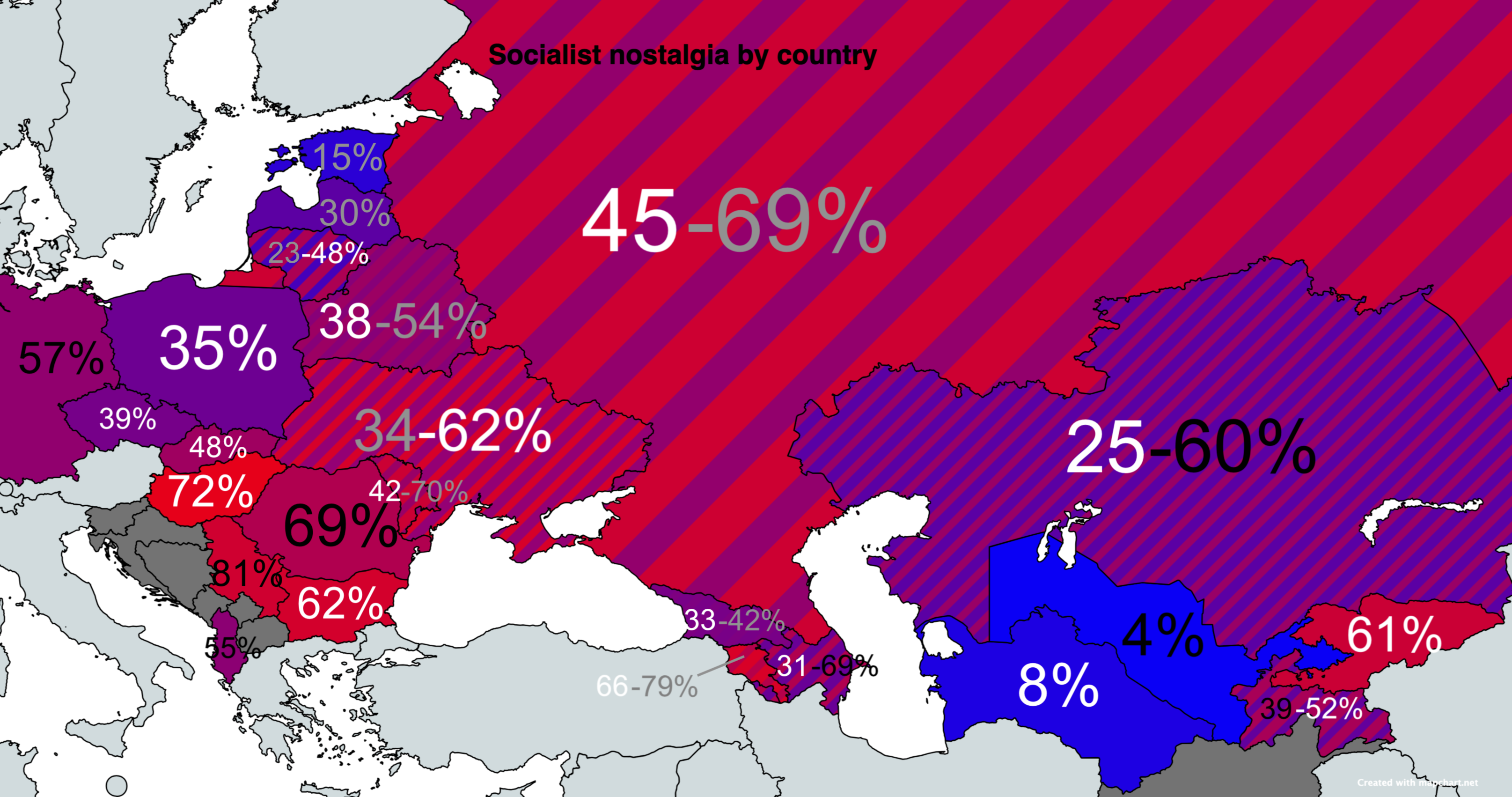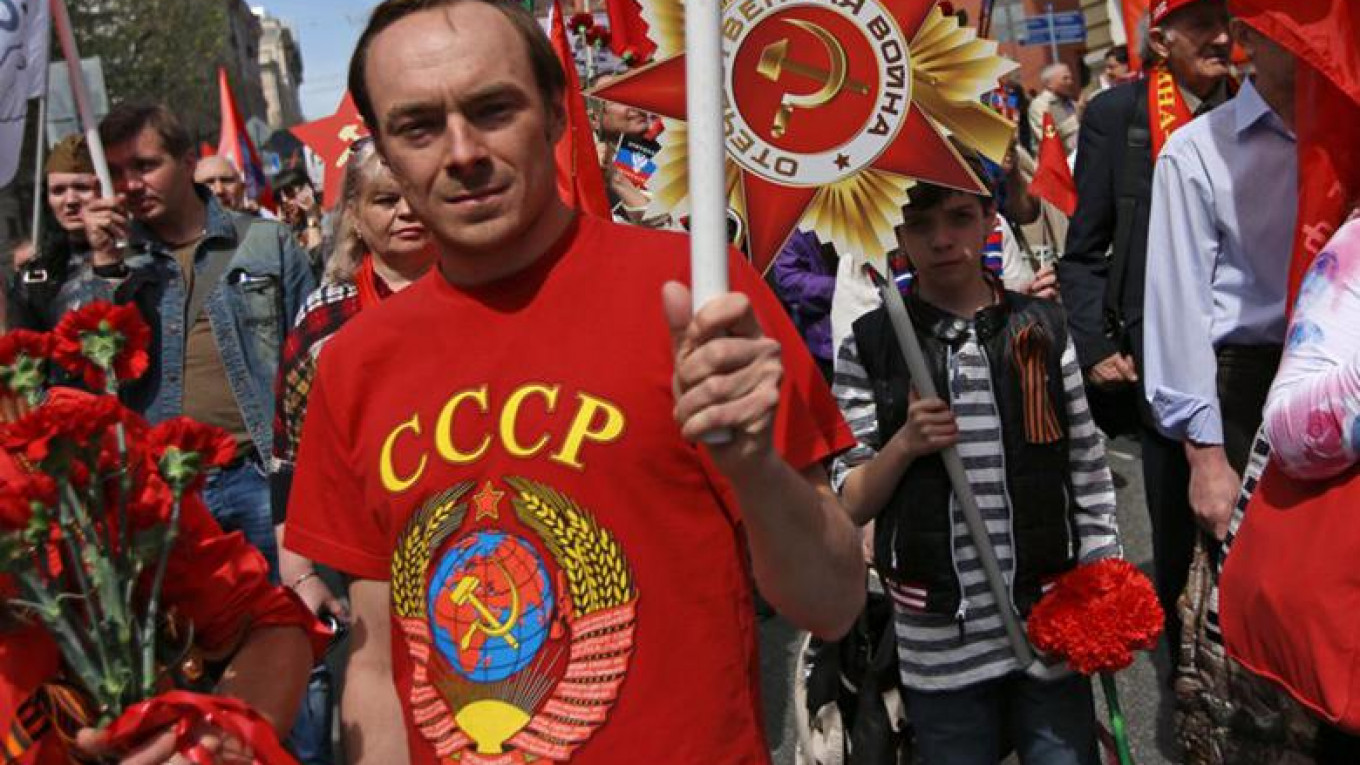More languages
More actions

Communist nostalgia, also known as socialist nostalgia, is a political and cultural phenomenon in former socialist states where significant portions of the population and oftentimes majorities long for a return to socialism as they become disillusioned with the new capitalist system that replaced it.
Contrary to the notion that nostalgia for socialism is only popular in ex-communist countries among the college-educated youth who never experienced it, older generations as well as non-college-educated people across the board in former Eastern Bloc countries are less likely to approve of the change to a market economy, less likely to approve of the change to a multi-party system, and less likely to be satisfied with their current lives.[1]
Former Soviet republics[edit | edit source]
Armenia[edit | edit source]
71% of Armenians believe life was better in the Soviet Union,[2] and only 12% believe Armenia benefitted from the overthrow of the Soviet Union in 1991.[3]
Azerbaijan[edit | edit source]
69% of Azerbaijanis think life was better in the Soviet Union.[2]
Belarus[edit | edit source]
53% of Belarusians believe life was better in the Soviet Union.[2]
Estonia[edit | edit source]
Georgia[edit | edit source]
57% of Georgians see Stalin positively compared to only 18% for Gorbachev.[4]
Kazakhstan[edit | edit source]
60% of Kazakhstanis believe life was better in the Soviet Union.[2] 82.4% believed that the Soviet Union responded to citizens' needs.[5]
Kyrgyzstan[edit | edit source]
61% of Kyrgyz people believe the dissolution of the USSR harmed Kyrgyzstan and only 16% say it helped.[3] 87% believed that the USSR responded to citizens' needs.[5]
Latvia[edit | edit source]
Lithuania[edit | edit source]
Moldova[edit | edit source]
60% of Moldovans who lived in the Soviet Union say life was better then.[2] Only 26% say Moldova benefitted from the dissolution of the USSR.[3]
Russia[edit | edit source]

In the Russian Federation, 75% of people believe that the USSR was the best time period in Russian history.[6] In 2009, 58% of Russians said it was a "great misfortune" that the Soviet Union no longer exists.[1] In 2019, Stalin had a 70% approval rating in Russia.[7]
In 1999, 58% of Russians agreed that their country should have stayed how it was before 1985, and only 27% disagreed.[8] 64% of Russians believe that life was actually better under the USSR.[2] 55% of Russians believe that the overthrow of the Soviet Union caused more harm than good compared to 19% who support the change to capitalism.[3]
62% of Russians prefer a planned economy over a market economy and 49% prefer the Soviet political system, including 62% aged 55 and older.[9]
Tajikistan[edit | edit source]
52% of people in Tajikistan believe the dissolution of the USSR harmed their country, and only 27% believe it helped.[3]
Ukraine[edit | edit source]
62% of Ukrainians believe that life was better under socialism.[10] 56% of Ukrainians believe the breakup of the Soviet Union was bad for Ukraine and only 23% say it was good.[3]
Uzbekistan[edit | edit source]
In 2005, 70.2% of Uzbeks agreed that the Soviet government responded to citizens' needs.[5]
Eastern Bloc[edit | edit source]
Albania[edit | edit source]
55% of Albanians have a positive view of former leader Enver Hoxha.[11]
Bulgaria[edit | edit source]
62% of Bulgarians say life was better in the People's Republic of Bulgaria.[10]
Czechia[edit | edit source]
Nostalgia for communism isn't very common in the Czech Republic. In 2009, only 47% of Czechs polled said that life is better now than it was under communism compared to 39% who said it was worse. When specifically asked about the economic situation, 45% said that things are better now than they were under communism as opposed to 39% who stated that things are worse. 80% of Czechs polled approved of the change from a one-party state to a multi-party state and 79% approved of the change from a planned economy to a market economy (with 63% agreeing that most people are better off under the free market). 49% were satisfied with their lives in 2009 compared to only 23% in 1991. When asked to rate their lives on a scale of 1 to 10, with 10 being "the best possible life for you", a relative majority of Czechs (49%) answered with a 7 or higher in 2009.[1]
Communism's relative unpopularity among Czechs is reflected in the government, with not a single person in the Chamber of Deputies being a member of the Czech Communist Party since the 2021 election. The older generation is typically less satisfied with liberal reforms and the current state of things in their country,[1] with the average age for KSČM members being 75 according to the party's own newspaper.[12]
With all that being said, 53% of Czechs polled think that the dissolution of Czechoslovakia was a bad idea, and those polled are evenly split on whether or not they're satisfied with their new "democracy." Only 18% of Czechs think that elected officials care what they think, down from 34% in 1991. In 1991, 87% of Czechs supported the move towards a free market; in 2009, only 79% did. A relative majority of 37% of Czechs said that their country's economic integration into the EU weakened their economy compared to 31% who say that their economy was strengthened. 70% are dissatisfied with the way things are going in their country.[1]
Germany[edit | edit source]
In former East Germany, 57% of the population polled believes that life was better under socialist rule. 49% of former GDR residents believe that "The GDR had more good sides than bad sides. There were some problems, but life was good there."[13] Nostalgia for East Germany is so common that there's even a word for it: Ostalgie, a portmanteau of the words Ost (meaning "east") and Nostalgie ("nostalgia"), sometimes anglicised as Ostalgia or Eastalgia.
Hungary[edit | edit source]
In Hungary, an outstanding majority of people numbering at 72% believe that life was better in the Hungarian People's Republic.[10]
Poland[edit | edit source]
Romania[edit | edit source]
One 2014 survey found that 69% of Romanians believe life was better under socialism and 66% would vote for former leader Nicolae Ceaușescu if he was still alive.[14]
Slovakia[edit | edit source]
66% of people in Slovakia believe life was better under socialism and only 8% believe it was worse.[15] However, a relative majority of Slovaks (49%) think that the dissolution of Czechoslovakia was a good thing.[1]
Other countries[edit | edit source]
Afghanistan[edit | edit source]
Angola[edit | edit source]
Mongolia[edit | edit source]
Yugoslavia[edit | edit source]
Bosnia and Herzegovina[edit | edit source]
Croatia[edit | edit source]
Macedonia[edit | edit source]
Montenegro[edit | edit source]
Serbia[edit | edit source]
81% of Serbians believe life was better under socialism.[16]
Slovenia[edit | edit source]
References[edit | edit source]
- ↑ 1.0 1.1 1.2 1.3 1.4 1.5 "End of Communism Cheered But Now with More Reservations" (2009-11-02). Pew Research Center. Archived from the original on 2023-04-01.
- ↑ 2.0 2.1 2.2 2.3 2.4 2.5 Will Stewart (2016-08-17). "Back in the USSR: 64 per cent of Russians say life was better in the Soviet Union than now" Express. Archived from the original on 2022-06-16. Retrieved 2022-09-24.
- ↑ 3.0 3.1 3.2 3.3 3.4 3.5 Neli Esipova, Julie Ray (2013-12-19). "Former Soviet Countries See More Harm From Breakup" Gallup. Archived from the original on 2022-08-28. Retrieved 2022-09-24.
- ↑ "Religious Belief and National Belonging in Central and Eastern Europe" (2017-05-10). Pew Resarch Center. Archived from the original on 2023-10-07.
- ↑ 5.0 5.1 5.2 Kelly M. McMann (2005). Central Asians and the State: Nostalgia for the Soviet Era. [PDF] Case Western Reserve.
- ↑ 75% of Russians Say Soviet Era Was 'Greatest Time' in Country’s History – Poll
- ↑ "Anticommunism Fails: 70% of Russians have a positive opinion on Joseph Stalin" (2019-04-17). In Defense of Communism. Archived from the original on 2021-06-29.
- ↑ Austin Murphy (2000). The Triumph of Evil: 'The Documented Facts about Eastern Europe and Communism' (p. 71). [PDF] Fucecchio: European Press Academic Publishing. ISBN 8883980026
- ↑ "What Do Russians Think Russia Should Be Like?" (2021-10-05). Levada. Archived from the original on 2022-05-21. Retrieved 2022-09-24.
- ↑ 10.0 10.1 10.2 "People Worse off than Under Communism?" (2010-04-21). Pew Research Center. Archived from the original on 2020-11-12. Retrieved 2022-09-24.
- ↑ "Former dictator still seen in positive light by many Albanians, poll shows" (2016-12-09). Tirana Times. Archived from the original on 2022-08-27. Retrieved 2022-10-08.
- ↑ Kottasová, Ivana (2021-11-08).: "Communists have now left the Czech parliament, more than three decades after the Velvet Revolution". CNN. Retrieved 2024-12-23.
- ↑ Majority of Eastern Germans Feel Life Better under Communism
- ↑ "'Con el comunismo se vivía mejor': el 66% de los rumanos votaría al dictador Ceausescu" (2014-04-10). El Mundo. Archived from the original on 2022-01-15. Retrieved 2022-09-24.
- ↑ Robert A. Lindsay (2010-05-16). "Nostalgia For Communism in Russia and Eastern Europe" Beyond Highbrow. Archived from the original.
- ↑ "Serbia Poll: Life Was Better Under Tito" (2010-12-24). Balkan Insight. Archived from the original on 2022-05-09. Retrieved 2022-10-08.
